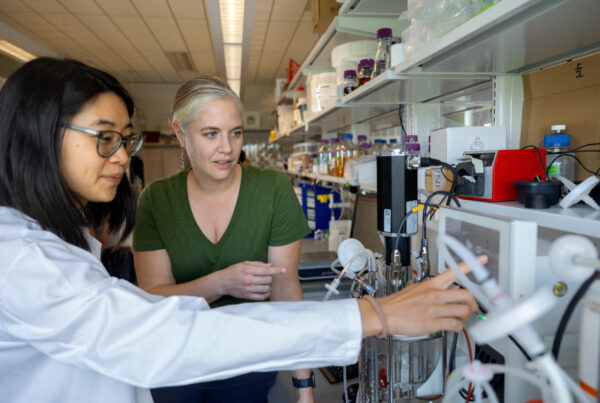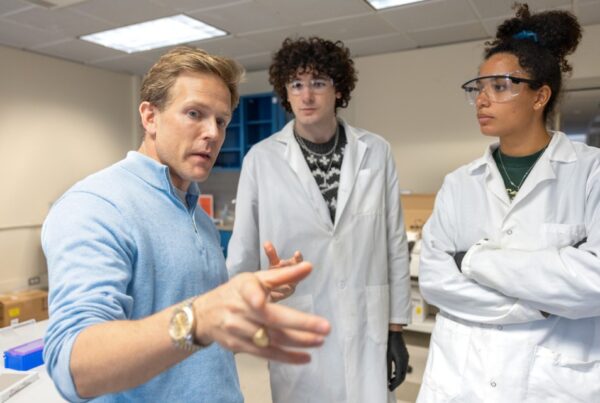On January 14, 2022, the Center for Technology Licensing (CTL) at Cornell University kicked off the new year by announcing the selected projects for Ignite: Innovation Acceleration funding program for the 2021 fall cycle. The funding will help Cornell faculty advance their inventions toward licensing, startup formation, or industry partnerships.
This year, the umbrella program Ignite Cornell Research: Lab to Market funding expanded thanks to a significant infusion from the Office of the Provost of $3 million in the fiscal year 2022, as well as the support and generosity of a $1 million gift from Peggy J. Koenig ’78, chair of Boston-based private equity investment firm Abry Partners, LLC. Learn more about Ignite program expansion here.
The program has funded 3 – 5 projects in past cycles. For the 2021 fall cycle, ten faculty were awarded thanks to the program’s expansion, doubling the opportunities to bring outstanding technologies closer to commercialization. The projects were:
- Controlled Molten Metal Deposition: Towards Low Cost, High-Value Metal Additive Manufacturing
Dr. Atieh Moridi, an assistant professor at the Sibley School of Mechanical and Aerospace Engineering, proposed a novel additive manufacturing (AM) technology that employs a drop-on-demand approach to facilitate the metal additive production at the microscale using a metal sheet as feedstock.
- DNA Sequencing Technology to Screen for Infection with High Sensitivity and Specificity
Developed by Dr. Iwijn De Vlaminck, this technology is a contamination-free metagenomic DNA sequencing (Coffee-seq) that is robust against environmental contamination. Coffee-seq method tags the DNA in the sample before preparation. After tagging, any contaminating DNA introduced in the sample is bioinformatically identified and removed. Dr. De Vlaminck is an associate professor at the Meinig School of Biomedical Engineering.(/p>
- Cartilage-Targeted C’Dots for Osteoarthritis Therapy
This new approach to leverage the biological potency of cytokine-blocking antibodies is proposed to treat osteoarthritis. Dr. Lawrence Bonassar, the Daljit S. and Elaine Sarkaria Professor in Biomedical Engineering, uses C’Dots, an ultrasmall molecule developed at Cornell University 15 years ago, to target binding components of the extracellular matrix (ECM) that are unique to articular cartilage, the primary tissue lost in osteoarthritis.
- Translating Cornell Innovation to Address Critical Fragility Around Water Status in Food and Agriculture Industry
AquaDust, a nanoscopic gel, is a sensor for water status that accurately measures the water potential in soil, leaves, and synthetic membranes. It addresses the frustration associated with the current, slow, unreliable, and destructive techniques for measuring water status. The technology was developed by Dr. Abraham Stroock, a professor at the Smith School of Chemical and Biomolecular Engineering.
- Commercializing Pepper-Shaped Tomatoes
Dr. Phillip Griffiths, an associate professor at the School of Integrative Plant Science Horticulture Section, genotyped a variety of tomatoes shaped like chili peppers and baby bell peppers in multiple colors. This product represents new and unique classes of tomatoes that are not currently available in the market.
- ReMOTES: A Platform for Miniaturized Wireless Electrochemical Sensing
Dr. Paul McEuen, the John A. Newman Professor of Physical Sciences at the College of Arts and Sciences, created ReMOTES (Redox Microscale Optically Transduced Electronic Sensors) which are microscopic wireless electrochemical sensors that can quantitatively probe the electrochemical properties of tiny (sub-mL) fluid volumes and wirelessly transmit the results using light.
- Towards Marketing Hybrid Genetics, Fast-Tracking Production Efficiency, and Profits in Dairy and Beef Cattle Farms
This technology developed by Dr. Vimal Selvaraj, associate professor of Integrative Physiology at the Department of Animal Science, will allow first-generation hybrid (F1) cows to be immortalized as stem cells and efficiently recreate genetic copies of F1 hybrid production animals indefinitely.
- CysRx: An mRNA-Based Ferroptosis Inducer for Cancer Therapeutics
This technology can effectively suppress tumor growth in vitro and in vivo by maximizing cancer cell ferroptosis. To potentiate ferroptosis in cancer, Dr. Shu-Bing Qian, The James Jamison Professor in Nutrition, Division of Nutritional Sciences, harnessed the cysteine stress response (CSR) pathway by developing a synthetic mRNA reagent CysRx to convert cytosolic cysteine to lysosomal cysteine.
- Novel Therapies to Promote Peripheral Nerve Regeneration
An associate professor of Neurobiology at the Department of Biomedical Sciences, Dr. David Lin, developed two technologies that provide new solutions to enhance nerve regeneration. The first one uses olfactory neuron culture-derived extracellular vesicles (EVs), and the second uses delta protocadherins as mediators of axon growth. Both EVs and purified delta protocadherin protein can be added to hydrogels to enhance and promote neural regeneration during surgical nerve repair.
- Vapor-Deposited Antifouling Coatings for Seawater Desalination
The initiated Chemical Vapor Deposition (iCVD) is a technology developed by Dr. Rong Yang, an assistant professor at the Smith School of Chemical and Biomolecular Engineering, to prevent the fouling of state-of-the-art reverse osmosis (RO) membranes during seawater desalination.
Ignite Innovation Acceleration is one of the four signature programs under the Ignite Cornell Research: Lab to Market umbrella. The program is open to proposals related to technologies that have been disclosed to CTL from Ithaca, Geneva, or Cornell Tech campuses.
Are you developing a breakthrough technology with potential for commercialization and are interested in this program? The application period for the 2022 spring cycle opens on March 14, 2022.
For more information, visit Ignite website here.
Media Contact
Veronica Buezo Talavera
Manager, Digital Media & Marketing
CTL
vbt6@cornell.edu






